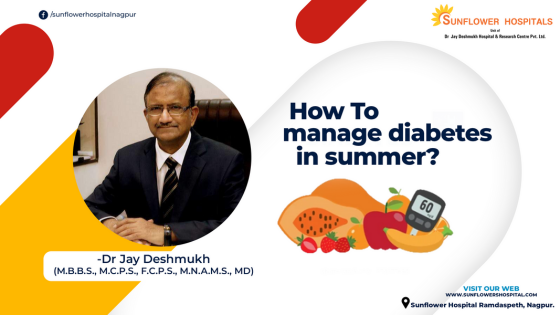How does summer affect diabetes control?
Getting dehydrated is quite common among elderly diabetics. This leads to high blood glucose levels and further complications. Loss of sweating in diabetics can lead to heat exhaustion or sunstroke if exposed for a long duration of time.
What happens to blood glucose in diabetics in summer?
The blood glucose can suddenly go up or down depending on circumstances. Extra physical activity outdoors during the day can suddenly lower blood glucose. Insulin if not properly stored may reduce its efficacy. Diabetes supplies can be affected by warm weather.
What should be done about these supplies?
Do not leave your glucometer, glucose strips, tablets, or insulin in direct heat. Do not leave them in vehicles that are hot due to summer heat. Store them in a cool dark place. Do not put ice packs on any of these.
What are the symptoms that we need to watch for?
It is wise to look for heat exhaustion, hypoglycaemia, and high blood glucose. The symptoms associated with these can overlap. They all need attention and sometimes care from a doctor.
What are warm weather diabetes management tips?
You need to protect yourself from heat and humidity and at the same time avoid complications. Diabetics need to keep them well hydrated, avoiding sugary beverages. Steer clear of alcohol. Please be in the shade, as the heat index is higher in direct sunlight. Wear loose-fitting light clothes. Always check your medications. Hot weather leads to fluctuations in blood glucose levels, and frequent measurement of levels becomes necessary. Exercise indoors, this will reduce the effects of heat and humidity.
What are the symptoms of heat exhaustion in diabetics?
When your body gets overheated, you get symptoms of heat exhaustion. These include lightheadedness, dizziness, headache, muscle cramps, low blood pressure, excessive sweating, nausea, a weak rapid pulse and cool moist skin, even in hot weather.
What about low blood glucose in diabetics?
Since metabolism runs higher in summer and insulin absorption increases in warm weather, the risk of hypoglycaemia will increase in summer. The symptoms of hypoglycaemia may include confusion, blurry vision, anxiety, tremors, sweating, and palpitations. Always keep a supply of glucose, and sweets with you to combat hypoglycaemia. Make sure to carry your glucometer whenever you travel or exercise outdoors. Blood sugars below 70 mg are generally associated with hypoglycaemia.
What about physical activity and diet?
Staying active, and remaining indoors, is the key to management. The best time to walk is 1 to 3 hours after your meals. Having fibre-rich foods can maintain your blood glucose without many fluctuations. These include whole grains, oats, brown rice, whole grain bread, cereals, some fruits, vegetables, tomatoes, and carrots. Avoid fruit juices completely. They cause a sudden spike in blood glucose levels. Stay hydrated and monitor blood glucose levels more frequently.


